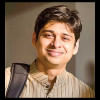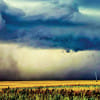The darkest hour

After a decade of separation, my four sisters and parents had planned to finally meet in the US. My elder sister travelled across the Atlantic from the UK, my father from Bangladesh, another sister from the West Coast to meet the rest in the East Coast of the US. One of my sisters, Mouna (whom I have always addressed as Myna), almost managed to convince me to apply for a US visitor visa. But then, the attacks on Gaza happened. I could not get myself to travel to a country that continued to supply weapons and provide unconditional political support to the Netanyahu regime.
Then Abu Sayed appeared before all of us. With his outstretched arms, with his head held high, with his simple yet impenetrable courage! That changed everything.
I, who always thought it wise to stay out of the political binary, decided the time for patience and silence was over. As I stepped out of our apartment the next day, I found my wife, Sara, and my friend, Snehadri, by my side. I was certain of one thing, if we didn't go out and protest, the next child to receive a bullet in his chest would be mine.
Out there we found so many of our children. Boys and girls alike. The age-old trifurcated system of English, Bangla, and Madrasa mediums of education had suddenly evaporated. They were all there. All chanting the same slogan, "WE WANT JUSTICE!"
To my surprise, I found the mothers closely following their sons and daughters. They were afraid. Afraid of the tear gas, the rubber bullets, the cleavers, and the live rounds. But falling back was not an option. Because falling back meant betraying Abu Syed. And he was standing right there. All the while.
I managed to upload several images and video footages on social media. One of these was particularly disturbing for my family, who had managed to come together in the East Coast by that point. I can hardly imagine what they went through when all communications in the country were severed by the government. I later learnt my 83-year-old father barely slept during those five days and nights. My mother, whose life revolves around her plants that have often made us siblings envious, went out to join a gathering outside the White House defying incessant rain. An umbrella in one hand, and a placard in another. The support I received from my family moved me to the core. Even my uncle, with whom I had fallen out of contact a long while ago, reached out, spoke out, and wholeheartedly supported our cause.
During the days of the internet blackout, all social media platforms were hushed. All we had remaining on TV was the voice of Tanvir Chowdhury on Al Jazeera English. BBC would follow his lead a couple of days later. But at least four newspapers kept fighting: Prothom Alo, The Daily Star, Samakal and last but not the least, New Age with the uncompromising Nurul Kabir as its editor. I must thank all the brave journalists who fought on despite all odds, risking their lives. Within my TV station, Channel 24, Zummatull Bida was my inspiration. Despite being hit by shotgun pellets, despite the attempts to seek her out when she was hiding among the students, she somehow managed to gather the courage to fight on. She went back out onto the field the very next day after being shot. That night, she had to keep her location a secret, even from her colleagues. You will always be remembered as the pioneers of truth, strength, and courage!
These people have shown us, no matter how ruthless an oppressor gets, no matter how much pressure is there to silence the media, there are always ways to keep on fighting. As individuals entrusted to inform the public, journalists must ask themselves at the end of each day, whether they have done justice to the duty they have taken up on their shoulders. It is a very personal burden that each news crew carries.
In Zumma's own words, "If at the end of a day's work we can look at the mirror and see no shame or guilt in our eyes, we are then fit for the next day's work."
These dark days and nights have taught us plenty. My only hope is that we remember the strength that lies with every individual. The strength to call a spade a spade, to speak out, when everyone else falls silent.
Manzur-al-Matin is an advocate of the Supreme Court and a freelance anchor at Channel 24.
Views expressed in this article are the author's own.
Follow The Daily Star Opinion on Facebook for the latest opinions, commentaries and analyses by experts and professionals. To contribute your article or letter to The Daily Star Opinion, see our guidelines for submission.

 For all latest news, follow The Daily Star's Google News channel.
For all latest news, follow The Daily Star's Google News channel. 









Comments